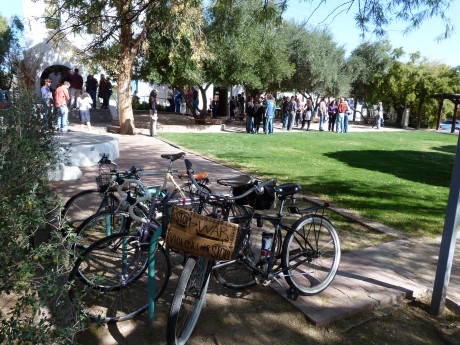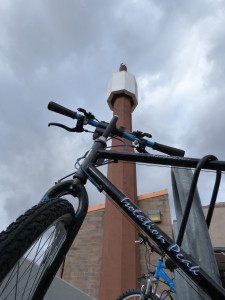Editor’s note: This post was written by Colby Henley one of Tucson Velo’s newest contributors. Henley is a daily bicycle commuter and advocate.
On a recent Sunday at Vineyard Christian Community, I asked Dustin Shaber if riding his bike to church was just a matter of convenience or if it meant anything deeper for him. “I don’t really think about it because I bike almost everywhere. But yeah, it naturally fits with my faith” he said. “I think riding a bike is probably more consistent with Jesus’ teachings than driving a big polluting truck.”

It’s not surprising to see bike racks filled at places of worship around the UA campus or near downtown because of the relatively high percentage of bicycle riders in those areas. But why don’t many suburban churches, mosques, and synagogues have bike racks? Is location alone the deciding factor? Do urban places of worship have a different ‘transportation’ theology than suburban ones?
With the growing “Green” trend over the past decade, Creation Care (the idea of humanity’s responsibility to take care of the earth because it is part of God’s creation) has seen an increased expression in faith communities. Some examples include Christian churches organizing an annual Bike to Church day, the Jewish environmental group Hazon, which advocates sustainable living and bicycling, and stories of Muslims completing a 9 month Hajj (journey to Mecca) by bicycle. There’s even a Buddhist Bicycle Pilgrimage.

Sean Benesh, an adjunct professor and church planter who has lived in Tucson and Vancouver BC, now lives in Portland and has written extensively about the deeper connections between the bicycle and faith. In his most recent book, View from the Urban Loft, Benesh writes about the growing trend of stewardship of creation and asks, “but has that led to how we imagine church? The proliferation of the mega-church goes hand-in-hand with the ongoing rise of the automobile. The two are compatible and without the auto there’d be no mega-church. Even if you look at the campuses of most mega-churches you’ll notice the actual building is a rather small footprint in comparison to the endless sea of parking lots. I’ve asked this before and I’m asking it again today, ‘What would church be like if people walked or biked to your gatherings?'”
In a blog post, Marcus Hathcock jokingly asked a similar question. “If one day we woke up and our cars were raptured (ha!), if our independence of travel was stripped away, what would church look like? I think it’d be pretty interesting. It’d be messy, for sure. You’d see petty stylistic things and doctrinal differences take a back seat to unity, because, as they’d say, “You’re all I’ve got.”
With chapter titles like High-Density, Walkable, and Bike-Friendly Cities, Theology of the Built Environment, and Pedestrian-Oriented Church Planting, Benesh goes further and explores how infrastructure and transportation choices impact the culture, inclusivity, and ministry of faith communities. Benesh argues that churches focused on neighborhoods within walking and biking distance are more rooted and in a better position to be a positive influence in their communities.
If you practice a faith, do you think the distance/method you travel to worship makes a difference? Would you be more inclined to attend a service that accommodated bicyclists or was within biking distance?

Great post Colby. I’m not a religious person, but it seems to that you’ve pinpointed a great opportunity for churches and churchgoers to make a difference in the community. I live by one of those mega churches and I am amazed — and often irritated — by the deluge of vehicles that descend 2-3 times a week. The parking lot is bigger than the church and it still overflows into the neighborhood creating traffic problems and a hazard for peds and cyclists. It would be great if cyclists in these congregations could push church leaders to promote bike commuting and alternative transportation for services. They could even raise funds by selling jerseys.
[…] Bicycles and faith: Combining transportation and religionTucson Velo (blog)Henley is a daily bicycle commuter and advocate. On a recent Sunday at Vineyard Christian Community, I asked Dustin… […]
Back in my regular church-going days, I went to a church that wanted to be a mega-church when it grew up. It was already pretty big, but wanted to be even bigger. Or so its leadership said.
Down at the grassroots level, I got two responses to my riding to services. They broke down to “That’s cool!” and “You got here on a Cannondale instead of a Cadillac? What kind of poor person are you?”
I might add that this church had a rather upscale demographic to it.
Any-hoo, let’s just say that I never felt completely comfortable there.
I actually ende up making some pretty drastic moves in my church involvement based around my conviction that Jesus asks us to take care of the earth and reduce our footprint on it (not directly or in those words, but by implication of its larger themes and exegesis, if you will, of my own life’s choices’ eventual impacts). Moved from suburbs to city and from commuter church to locally based neighborhood house church so that my choice to ride bicycles for transportation would not leave me ridiculously on the fringe of my faith group.
I agree that Christian doctrines and theology are generally in harmony with low impact transportation such as cycling, but there are a variety of mitigating circumstances that typically keep church-goers in their cars on Sunday mornings. They tend to be married, frequently with children, and usually dressed in nicer clothes. Combine that with the nasty fact that most attend a church they select for every reason except proximity to their domecile, and you have a set-up that isn’t conducive to using bikes. The Dutch have adapted to bikes because their government has placed severe economic penalties on driving and have installed seperate bike paths. I can also add that it’s easier to add clothes to deal with Holland’s cool temps, but you have limited options to stay cool in our summer heat.
Well, yes, Red Star wondered when a Tucson Velo post such as the above would happen…
If there are no bicycles in heaven, I don’t want to go there.
……” my choice to ride bicycles for transportation would not leave me ridiculously on the fringe of my faith group. ”
I wonder how bicycling to ‘meeting’ would be viewed by the Amish,
a fringe faith group. I guess
we should be used to not fitting in.
Good article Colby, Biking to gather with others to seek God fits well with our city and future trends of urban, earth saving living. May there be more options on where to gather locally soon…..
Another twist on biking is not just “going to church”, but “being church”.. biking gets us closer to the street and people and we can stop and get involved. One of the most profound experiences for me was when I was only investigating the teachings of Jesus… and one night after buying $20 of pot….. when I wanted to quit…. and riding to a party.. I felt Jesus say.. “you just blew $20…. stop and give that guy $5”.. to a homeless man walking with a couch pad under his arm… and so I did.. and the man was so thankful.. and I’ll never forget it… so let’s see faithful people get off their bikes and help others.. when Jesus says so…
Maybe it’s a pollyanna wish, but churches working together to promote things like cycling would be a great way for different faiths to work together and form better relationships between faiths instead of feeding the distrust and even enmity between some religions. Of course, it would only work on a local level, but that’s how such movements start. While not a religious person it would be heartening to see members of a mosque, synagogue, and church working together to do something like that with the interfaith component being highlighted. It’d give me more hope that my daughter and her generation would inherit a slightly less violent world.